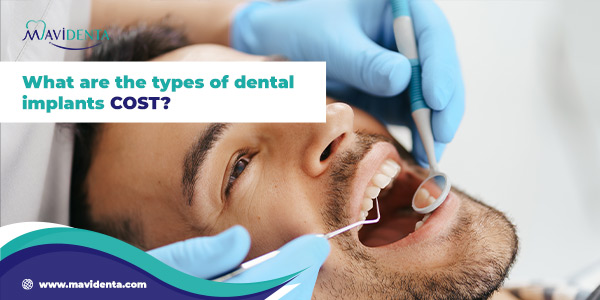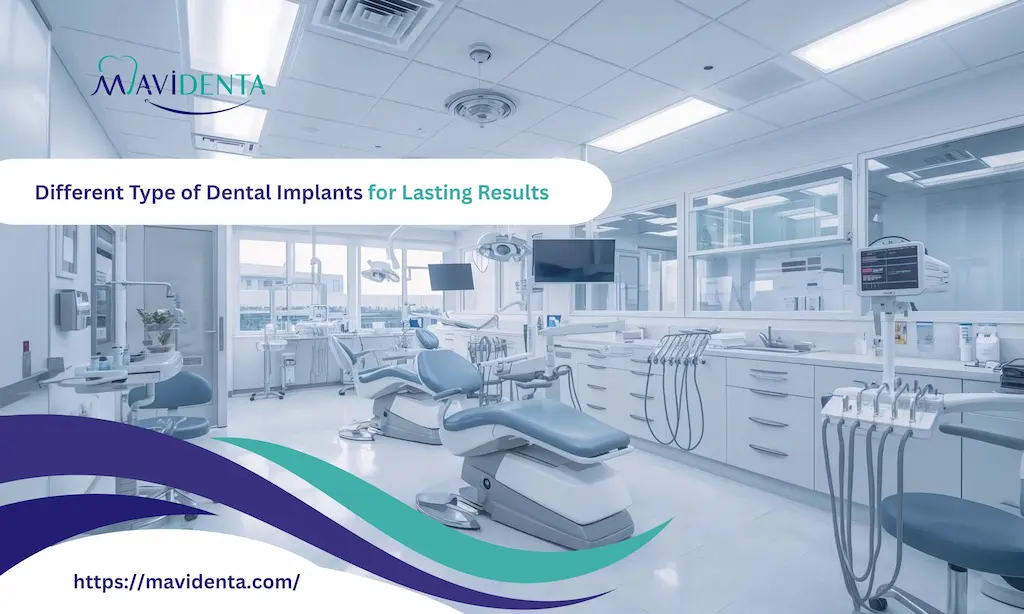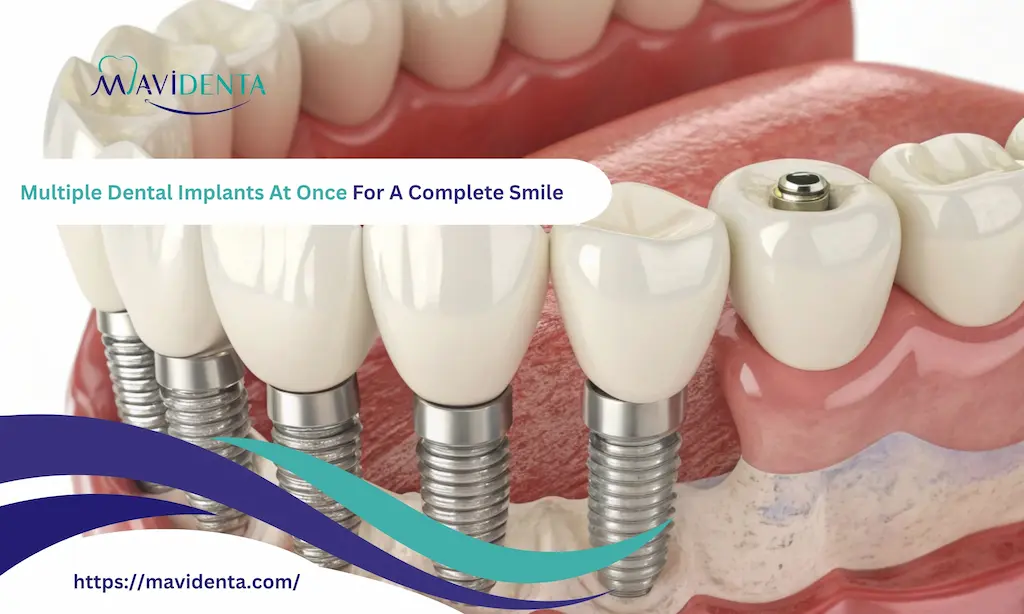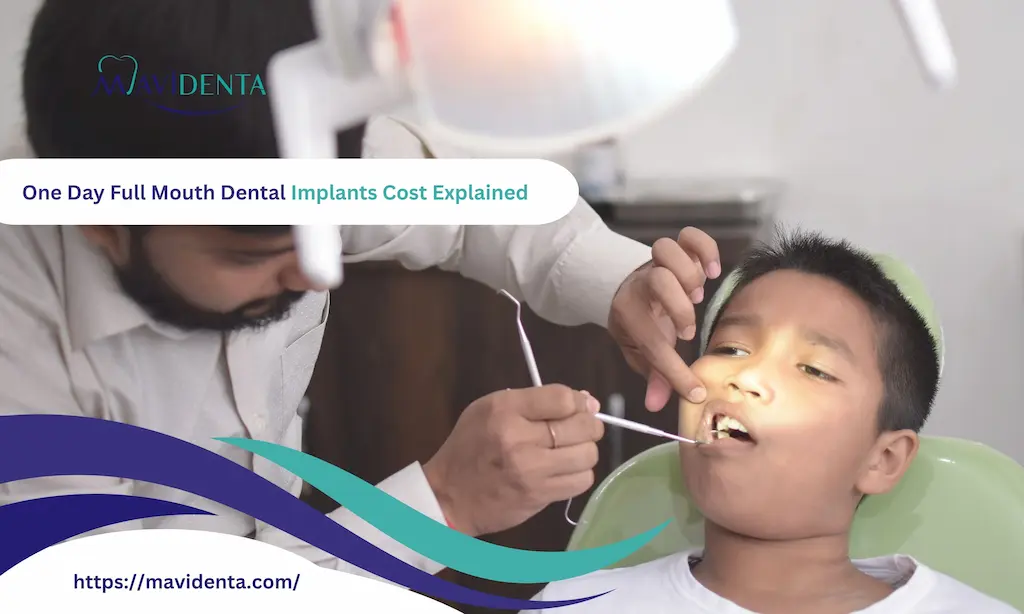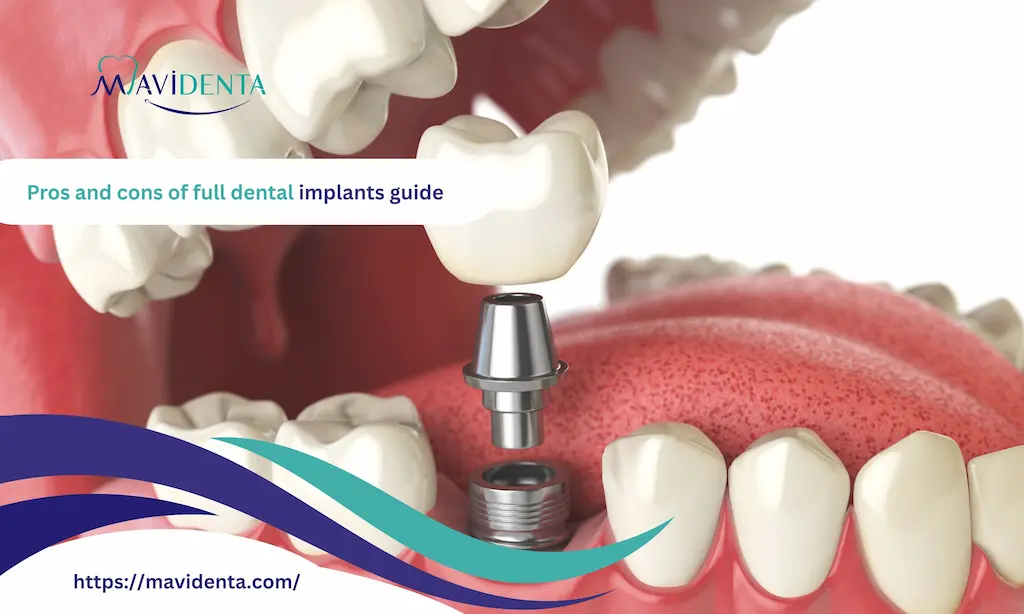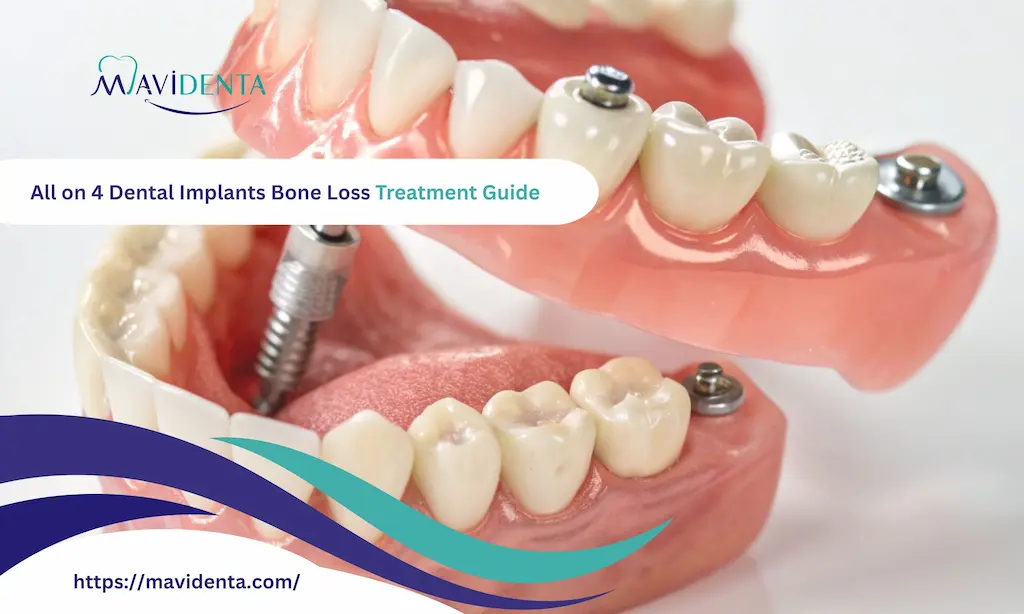Dental implants are one of the most permanent and responsive solutions for tooth replacement, providing a natural appearance and identical function to original teeth. So, we will discuss What are the types of dental implants cost?
What are Dental Implants?
A dental implant is a structure that replaces missing teeth using screw-like devices. The surgeon inserts an implant into the jawbone that acts as an anchor for the artificial tooth, which is called a crown. A device called an abutment connects the artificial tooth to the dental implant.
The crown is specially made to fit a person’s mouth and match the color of their teeth so that they look and function like natural teeth. They have several advantages over dentures, which are removable artificial teeth:
- More natural and comfortable.
- It has a higher success rate.
- Improve chewing function.
- It leads to a reduced risk of tooth decay in adjacent teeth.
- It leads to better bone maintenance at the site of missing teeth.
- Causes decreased sensitivity in nearby teeth.
- No need to take it out and clean it every night.
However, dental implants are not suitable for everyone as the implant devices must attach to the jawbone so a person’s bones must be healthy before they can undergo implant surgery. So in the next paragraph we will discuss What are the types of dental implants cost?
Also check: Best Turkish Dental Clinics.
What are the types of dental implants cost ?

What are the types of dental implants cost? There are two types of dental implants: intraosseous and subperiosteal. Endosteal implants are the most common type. The surgeon embeds them in the jawbone and each can hold one or more artificial teeth.
Or the surgeon attaches a subperiosteal implant to the top of the jawbone. Dental surgeons choose this option. The option is for people who do not have a high jaw bone.
Dental implant surgery is safe when a qualified and experienced surgeon or dentist performs it. Therefore, please visit Mavidenta clinic as it has modern technologies. Dental implants are the only option for dental restoration that maintains the health of a person’s jawbone and stimulates its growth.
Single Tooth Implant:
Speaking about What are the types of dental implants cost ? The process of single tooth implants is performed through several steps and in the dentist’s office as follows:
First: implantation of dental implants:
The operation is performed under local anesthesia. The doctor prepares the specific place for the implant by placing implants made of pure titanium metal in the jawbone in place of the missing tooth.
Second: Waiting for bone growth:
The jawbone and the implant fuse, called osseointegration. This process takes six months for the upper jaw and three months for the lower jaw.
Third: placing the stent:
The abutment is the piece to which the artificial tooth crown will connect to the metal implant. It is placed after osseointegration is complete.
Or they may be placed at the same time as metal implants. After placing the abutment, the gums need to heal for about two weeks before the artificial tooth is installed.
Fourth: Choosing artificial teeth:
After the gums heal, the doctor takes several impressions of the mouth and teeth. These impressions are used to make the crown (the outer part of the artificial tooth). The crown can only be placed after the jawbone is well strong to support the use of the new tooth.
Implant-Supported Bridge:
- It usually only takes two visits to the dentist to successfully install a dental bridge, and this is what you should expect when undergoing this type of cosmetic medical procedure:
- Preparing the natural teeth surrounding the dental bridge area for the bridge installation process. This includes filing the teeth and placing temporary crowns on them until the permanent crowns that will hold the bridge in place are manufactured.
- Installing the bridge with new dental crowns attached to it and fixing it in place with special materials on the next visit. The doctor then makes sure that the patient’s bite is appropriate and that the teeth are not too high for him.
- The possibility of requiring several subsequent visits to adjust the bite and ensure that the teeth of the jaws fit together in an appropriate and comfortable way.
All-on-4 Dental Implants:
- First, your dentist will order a CT scan and X-rays to evaluate your bone structure.
- Then based on the specific qualities of your mouth, you can find the strength positions of the four implants.
- Your dentist takes impressions of your mouth during these examinations. This information will also be sent to a laboratory where your custom dentures are manufactured.
- If you have remaining teeth, your dentist will extract them before treatment. Problems such as inflammation and cavities must be addressed before All-On-4 dental implants.
- After local anesthesia is applied, your dentist will begin drilling in 4 strategic places in your jaw.
- While the anterior gum drilling occurs in a vertical manner, the posterior implants will be slanted.
- Once the four implants are systematically inserted into the sockets, your doctor attaches the denture to the top.
- First, you will have temporary dentures waiting for your permanent fixtures to be manufactured and ready for placement within 6 months. This period is also useful to ensure that your implants are ready to support permanent dentures
3-on-6 Dental Implants:
When it comes to What are the types of dental implants cost ? The all on 6 dental implant procedure works to create a permanent dental structure for those who have completely lost their teeth, by implanting 6 implants in each jaw – 6 in the lower jaw and 6 in the upper jaw – to permanently attach a set of artificial teeth to them.
This procedure allows the patient to replace all of his missing teeth without the need for bone grafting in most cases to obtain strong, healthy replacement teeth with the ability to perform distinct functions.
Dental implants proceed according to this technology in 3 successive stages:
1-Pre-implant All in Six:
This is the examination and evaluation stage during which the patient evaluates the condition of the jaw:
- Are there any remaining teeth that need to be extracted or not?
- Is bone density sufficient or does the patient need grafts?
- Is there gingivitis that needs treatment or not?
- Are there mouth cavities, ulcers or any other problem or not?
The patient then undergoes an examination stage based on:
- X-ray imaging.
- Computed tomography.
The jaw is then well prepared for the actual implantation stage.
2-During all-in-six dental implants:
Here the doctor begins to place the 6 titanium implants in the jaw under local anesthesia. The doctor also installs temporary artificial teeth over the implants, and this only takes one day.
3-After dental implants all in six:
The jaw remains in a state of swelling and pain for a period ranging from one week to 10 days. During this time, one must adhere to the doctor’s instructions and take the prescribed painkillers, medications, and antibiotics on time.
Within 3 to 6 months, the temporary prosthetics are replaced with permanent teeth after there is complete fusion between the implants and the jaw bones.
All of these stages require careful care and follow-up from the doctor to his patient. Performing a successful operation also requires choosing an experienced doctor and a center characterized by professionalism.
To apply all six dental implant steps properly to obtain ideal results. This is what we promise you in the Mavidenta Dental Center series. If you are thinking There is no need for further hesitation, contact us now.
Also check : What is the best country for dental implants?
How Much Do Dental Implants Cost?
Many patients wonder about What are the types of dental implants cost ? The cost of dental implant surgery varies from one dental implant clinic to another due to many factors, and the following factors can affect this:
- Number and types of implants required
- Location of implants inside the jaw
- Whether any additional procedures are needed to prepare the mouth for surgery
- Some dental insurance policies cover a larger portion of the cost.
Other tooth replacement options, such as bridges, may be less expensive. However, bridges are difficult to keep clean and often require replacement and repair, which increases the overall cost. Dental implants may provide long-term benefits if the person takes good care of them, because here it requires you to visit clinics.
The Cost of a Single Tooth Implant:
The dental implant consists of three main parts: the metal screw made of titanium, the abutment that connects the metal screw to the crown, and the dental crown. Each of these parts has its own price. The average cost of dental implants in Turkey per tooth ranges between 400 and 1000 euros.
The Cost of a Multiple Tooth Implant:
What are the types of dental implants cost ? If you have several missing teeth but they are not adjacent, you will need a metal screw (implant) in place of each missing tooth. If you have missing teeth that are adjacent to each other, then you have the opportunity to install a dental bridge.
That can fill the gap resulting from the loss of three or four teeth next to each other with only one or two implants. As for the cost, it is clear that a dental bridge that relies on a smaller number of implants will be less expensive than assigning an individual implant to each tooth.
The Cost of a Full Mouth Implant:
The entire jaw teeth are implanted in several ways, including replacing each tooth with its own implant or implant. Therefore, this requires implants or implants for all the teeth in the mouth.
Also check: Istanbul Dental Implants Price.
What are the benefits of dental implants?

After we discussed the types of dental implants, what are the costs? Here are the most prominent benefits and advantages that you will get after dental implants in the Mavidenta dental clinic:
- Dental implants preserve natural tooth tissue by avoiding the need to cut, file, and reduce adjacent teeth to create a fixed dental prosthesis or an artificial dental bridge.
- Dental implants preserve the jaw bone structure because they reduce the load on the remaining natural teeth and preserve the supportive tissue around the natural teeth.
- Dental implants that have any problem can be replaced without affecting the adjacent natural teeth.
- The dental implant process is the integration of an artificial tooth into the jaw bones, and therefore, it is very stable.
- Improving the appearance, as dental implants look very similar to the patient’s natural teeth.
- Improving speech, as dental implants are the best compared to other options for replacing missing teeth.
- A more comfortable feeling. In the case of removable dentures, it can be relaxed for some people.
- Ease of eating: In the case of removable dentures, some may find it difficult to chew, but with dental implants, one can eat their favorite food without discomfort or pain.
- Dental implants give people a sense of confidence and a natural smile.
- Improving oral health, as dental implants do not require reducing the size of other natural teeth, as happens in cases of installing dental bridges, which allows the natural teeth to remain healthy and unaffected.
- Dental implants are the most durable type of dental implants, as the implanted teeth can last for many years.
- Dental implant success rates vary depending on their location in the jaw, but in general, dental implants have a 98% success rate, and with proper care, the implants can last a lifetime.
- Dental implants do not require returning to the dentist every once in a while to re-glue a dental crown or dental bridge. Therefore, dental implants are the best option to replace missing natural teeth with solid and stable artificial teeth.
Explore the Best Dental Implant Clinic in Istanbul.
Conclusion
After we discussed the types of dental implants, what are the costs? Dental implants are structures in the bone that replace missing teeth. They have a high success rate and can provide long-term benefits. Anyone considering dental implant surgery should ask their dentist if it is suitable for them, so please visit the dental center at Mavidenta because the doctors working there provide all services of jaw surgery, gum disease, dental treatment, and dental implants.
FAQs
Q1: What are dental implants?
Dental implants are screw-like structures placed into the jawbone to replace missing teeth. They act as anchors for artificial crowns, which look and function like natural teeth.
Q2: What are the main types of dental implants?
- Endosteal (Intraosseous) implants: Placed directly in the jawbone and can support one or more teeth.
- Sub periosteal implants: Placed on top of the jawbone and used for patients with low bone height.
Q3: What are the specific procedures available for dental implants?
- Single tooth implant
- Implant-supported bridge
- All-on-4 dental implants
- 3-on-6 (All-on-6) dental implants
Q4: How much does a single tooth implant cost in Turkey?
The average cost per tooth ranges between €400 and €1000, depending on materials, clinic, and additional treatments.

